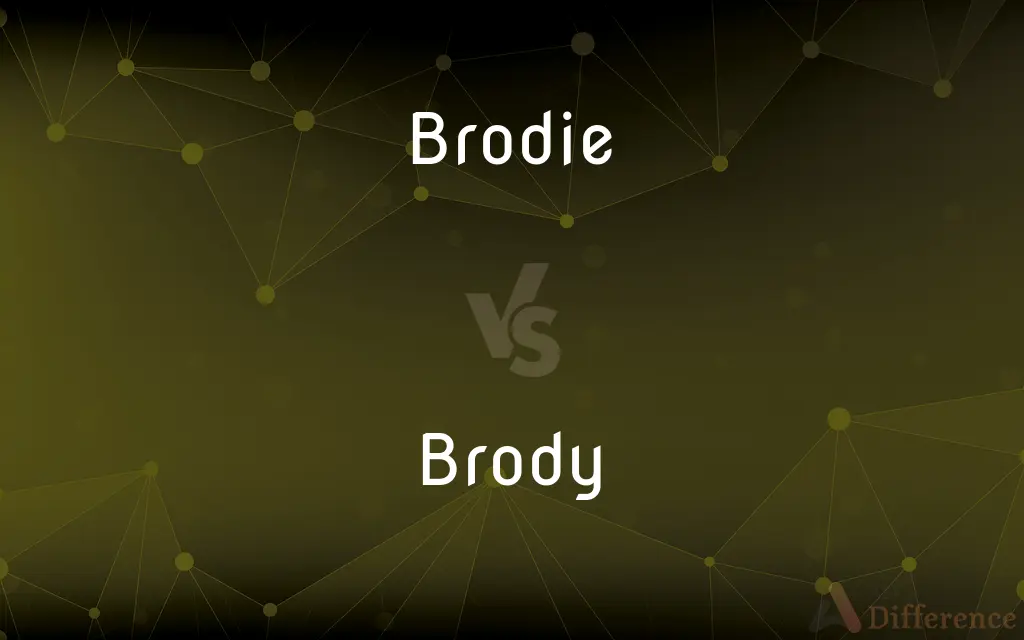Brodie vs. Brody — What's the Difference?
By Tayyaba Rehman & Maham Liaqat — Updated on March 26, 2024
While both are given names, "Brodie" often implies a Scottish origin, suggesting a connection to a place or clan, whereas "Brody" is a more anglicized version, widely used without specific geographic ties.

Difference Between Brodie and Brody
Table of Contents
ADVERTISEMENT
Key Differences
Brodie and Brody, although similar sounding and often used interchangeably, have distinct origins and nuances in their use and perception. Brodie, with its Scottish roots, is traditionally associated with the Brodie clan in Scotland and implies a connection to heritage and place. On the other hand, Brody, while also of Scottish origin, has become more anglicized and is used more broadly in English-speaking countries without necessarily implying a direct connection to Scottish heritage. It is perceived as a modern, versatile name for individuals regardless of their familial origins.
The spelling variations of Brodie and Brody also reflect cultural preferences and trends in naming. Brodie, with its "ie" ending, suggests a certain traditional or cultural adherence, mirroring the way many Scottish names maintain their distinctive spellings to preserve their original identity. In contrast, Brody, with its "y" ending, fits more seamlessly into a wide array of English-speaking contexts, making it a popular choice for parents seeking a name that is both modern and easy to integrate into diverse linguistic environments.
In terms of popularity, both names have seen fluctuating trends over the years. Brodie's popularity is often more pronounced in regions with strong Scottish influences or communities that value historical and familial ties to Scotland. Brody's popularity, on the other hand, can be attributed to its ease of pronunciation, spelling, and its ability to blend into various cultural and linguistic backgrounds, making it a common choice in countries like the United States and Canada.
The choice between Brodie and Brody can also be influenced by personal or familial preferences, with some opting for Brodie to emphasize their Scottish roots, while others prefer Brody for its contemporary feel and broader appeal. This decision often reflects a balance between honoring heritage and adapting to the globalized context in which the name will be used.
Culturally, names like Brodie and Brody can evoke different perceptions and associations based on their spelling and origin. Brodie might conjure images of Scottish landscapes, history, and clan culture, evoking a sense of heritage and tradition. Brody, with its more generic application, might be associated with a youthful, dynamic character, without the geographical or cultural specificity of Brodie. These cultural connotations play a role in how the names are chosen and perceived in society.
ADVERTISEMENT
Comparison Chart
Origin
Scottish, associated with the Brodie clan
Scottish, anglicized, broadly used
Cultural Connotation
Implies a connection to Scottish heritage and place
Modern, versatile, without specific geographic ties
Spelling Preference
"ie" ending suggests traditional or cultural adherence
"y" ending fits more seamlessly into English-speaking contexts
Popularity
More pronounced in regions with strong Scottish influences
Widely popular, especially in the US and Canada
Cultural Associations
Evokes images of Scottish landscapes and history
Associated with a youthful, dynamic character
Compare with Definitions
Brodie
Scottish origin, associated with the Brodie clan.
The name Brodie is often chosen to honor Scottish ancestry.
Brody
"y" ending makes it versatile in linguistic contexts.
The spelling of Brody allows for easy integration into diverse cultures.
Brodie
"ie" ending reflects traditional Scottish naming conventions.
Brodie's spelling is rooted in Scottish tradition.
Brody
Less directly tied to Scottish heritage.
Parents might choose Brody for its modern appeal rather than for heritage reasons.
Brodie
Popular in regions with Scottish communities.
In areas with Scottish heritage, Brodie is a common choice.
Brody
Anglicized version of a Scottish name, broadly used.
Brody has become a popular name across English-speaking countries.
Brodie
Evokes traditional Scottish imagery and values.
The name Brodie conjures images of Scotland’s rich landscapes and history.
Brody
Associated with a modern and dynamic character.
The name Brody is often perceived as youthful and contemporary.
Brodie
Carries historical and familial significance.
Naming a child Brodie may reflect a desire to maintain familial or cultural ties.
Brody
Widely popular in the United States and Canada.
Brody is a favored name among new parents in North America.
Brodie
Brodie can be a given name or a surname of Scottish origin, and a location in Moray, Scotland, its meaning is uncertain; it is not clear if Brodie, as a word, has its origins in the Gaelic or Pictish languages. In 2012 this name was the 53rd most popular boys' name in Scotland.
Brody
Brody (Ukrainian: Броди; Polish: Brody; German: Brody; Yiddish: בראָד, romanized: Brod) is a city in Zolochiv Raion of Lviv Oblast (region) of western Ukraine. It is located in the valley of the upper Styr River, approximately 90 kilometres (56 miles) northeast of the oblast capital, Lviv.
Brodie
(internet slang) A close male friend, or a man deserving of admiration; a bro.
Brody
(slang) Intentionally spinning in circles and sliding in an automobile.
I spun a brody in some chat up at the old zinc mine.
Common Curiosities
How does the spelling of Brodie and Brody affect their perception?
Brodie's "ie" ending may evoke a more traditional or Scottish connotation, while Brody's "y" ending offers a modern and versatile perception.
Are Brodie and Brody exclusively Scottish names?
While both have Scottish origins, Brody is used more widely and is not exclusively linked to Scottish heritage.
Is there a difference in popularity between Brodie and Brody?
Yes, Brody tends to be more popular in the United States and Canada, while Brodie's popularity is more pronounced in regions with strong Scottish influences.
Is the popularity of Brodie and Brody subject to trends?
Like all names, the popularity of Brodie and Brody fluctuates over time, influenced by cultural trends, famous personalities, and societal preferences.
Do Brodie and Brody have specific meanings?
Both names are associated with places and clans in Scotland, but they are primarily used today for their sound and cultural connotations rather than specific meanings.
What is the main difference between Brodie and Brody?
The main difference lies in their origin and usage: Brodie is closely tied to Scottish heritage and the Brodie clan, whereas Brody is an anglicized version used more broadly.
Are there variations in how Brodie and Brody are pronounced?
The pronunciation of Brodie and Brody is generally similar, with minor variations possibly reflecting regional accents.
Can the spelling of Brodie and Brody impact a child's identity?
Yes, the choice of spelling can reflect and influence cultural identity and heritage, with Brodie often signaling Scottish heritage and Brody being more neutral in this respect.
How do cultural contexts influence the choice between Brodie and Brody?
Cultural contexts, such as a family's heritage or regional naming trends, can influence the choice, with Brodie reflecting a stronger connection to Scottish roots and Brody being more universally adaptable.
Share Your Discovery

Previous Comparison
Inventory vs. Survey
Next Comparison
Vista vs. PanoramaAuthor Spotlight
Written by
Tayyaba RehmanTayyaba Rehman is a distinguished writer, currently serving as a primary contributor to askdifference.com. As a researcher in semantics and etymology, Tayyaba's passion for the complexity of languages and their distinctions has found a perfect home on the platform. Tayyaba delves into the intricacies of language, distinguishing between commonly confused words and phrases, thereby providing clarity for readers worldwide.
Co-written by
Maham Liaqat













































